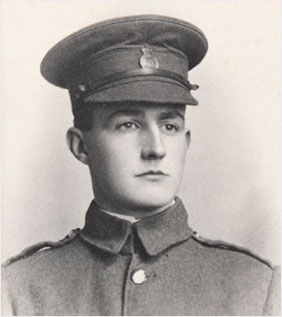Major Erskine Thackery Martin DSO
1888 – 1948
Erskine Thackeray Martin at Sandhurst, December 1908
ETH’s military career has been relatively straightforward to research as he was an Officer in the Royal Artillery. He served in much of the British Empire: Quetta, Karachi, Harrismith in the Orange Free State and Neemuch in India.
Military career
| 1888 | Born 31st January |
| 1908 | Joins Royal Artillery as Second Lieutenant |
| 1910 | 30th Battery, Karachi |
| 1911 | 30th Battery Quetta |
| 1913 | 99th Battery Harrismith, Orange Free State and promoted to Lieutenant |
| 1914 | 99th Battery Neemuch, India |
| 1914 | Promoted to Captain, 6th Divisional Ammunition Column - Mesopotamia |
| 1915 | Besieged by the Turks at Kut al Amara |
| 1916 | Prisoner of War as General Townshend surrenders to the Turks |
| 1917 | Released from captivity |
| 1918 | Promoted to Major |
| 1919 | Awarded DSO for service at Kut |
In the 1914 – 18 war he served in Mesopotamia – today’s Iraq – and was captured by the Turks at Kut al Amara in 1916. He spent the rest of the war in a prisoner of war camp. From there things get a little hazy. The librarian of the Royal Gourock Yacht Club has indicated that ETM was living in Inverkip in Scotland from 1923 to 1930. From 1930 to 1935, he was ‘overseas’ and we suspect he was based at Berehaven, Ireland in 1936. From 1945 – 48 his address was the Rocquaine Hotel, Torteval, Guernsey. From there the trail goes cold. Further updates on his past will be revealed as we learn more.
The Siege of Kut al Amara
At the time this was regarded as the greatest military disaster to have befallen the British Army. The Turks besieged Kut from 25th November, 1915 to 29th April, 1916. It lasted 147 days and exceeded the siege of Ladysmith which was just 121 days. During the siege conditions in Kut deteriorated rapidly. Rations were cut and horses and mules were killed for food. There was also a ceaseless long range artillery attack on the town which gave the garrison no rest; no part of the town was safe and the casualties mounted. Morale fell especially amongst the starving Indian infantry who refused to eat the flesh of the horses and mules. In a final effort to get food through to Kut, the Royal Navy sent in a river boat, the Julnar, crewed by volunteers. She was stopped by terrible gunfire from the Turks and most of her crew were killed. Messrs Cowley and Firman, the officers in charge, were posthumously awarded Victoria Crosses for their bravery. As food supplies were totally exhausted, General Townshend surrended to the Turks on 29th April, 1916. The casualties amongst the Allies were 1585 killed, 721 died of disease and 1886 were wounded. Over 12,000 men went into captivity and over 4,000 died in appalling conditions as they were force marched from today’s Iraq to Turkey en route to a number of prisoner of war camps.
Major Erskine Thackery Martin’s experience as a prisoner of war at the hands of the Turks is still being researched. However, if he is the same character as ‘Cockie’ in E H Jones’ account The Road to Endor (1920) then further insights are available. We are currently in contact with E H Jones’ granddaughter who is working on a film of her Grandfather’s exploits.





